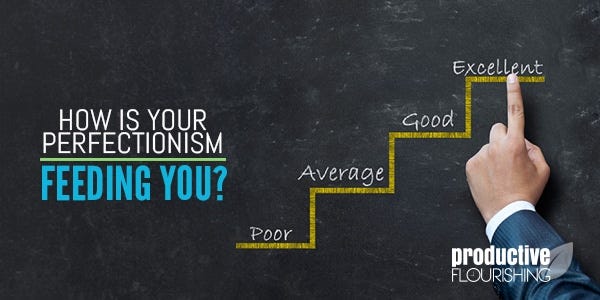How Is Your Perfectionism Feeding You?
A helping hand extended earlier is better than one withheld until perfection is achieved (since perfection is never achieved)
Are you grappling with perfectionism?
Rather than addressing the symptoms of perfectionism, let’s talk about one of its roots. There are others, but I’ll focus on one today.
Take a second to think about the story you tell yourself about being a perfectionist and pouring excess effort into completing something.
Is it that if you try your hardest, it’ll stand in place of the results you may or may not get from your efforts?
Do you crave the attention from doing too much, being stressed out, and overwhelmed by how much you’re doing? Does the sympathy for your overwhelm and fatigue fill the void left by not being truly understood and supported by those around you?
Does trying harder give you a convenient excuse for when mistakes happen, thereby making you feel more comfortable to wing it as long as you try hard enough?
It’s hard to let go of a story when it’s feeding you — even if the way that it’s feeding you is so subterranean and oblique, when the way that it’s harming you is so obvious and direct.
It’s also really easy to let our effort substitute for our results. Unfortunately, letting our effort substitute for our results tends to be unsustainable because we’re not leaving enough margin to determine if the way we’re working is working. It also doesn’t let us develop intelligent ways to ask for help and get support since the first thing we’ll do when we get some help is ratchet up the effort again.
All that excess effort and perfection-making means you care, after all.
Or does it?
Let’s pose the question this way: if you got the same benefit, would you prefer the people you care about to work twice as hard to get you those benefits as is necessary? Would you want people to wear themselves out for no more effective gain for you?
Or would you rather them approach their interactions with you in a grounded, energized, and open way instead of being stressed, tired, and scared that they might not be able to keep both ends of the candle lit?
Few people would be so inhumane and unreasonable with others, yet they are with themselves. Remember that the Mere Means Principle applies to how we treat ourselves as much to how we treat others.
A helping hand extended earlier is better than one withheld until perfection is achieved because perfection is never achieved. A solution that gets people started today is better than that potentially helps them finish but never gets shared. Seeing, hearing, and caring for people in a positive, generous, and fully-present way is better than half-seeing, half-hearing, and half-caring because you’ve stretched yourself too thin.
If your aim is to deliver results and benefits to people, focus on what gets them results and benefits — not how much effort it takes to get them.
Unless, of course, you want to make things harder than they need to be for you and those around you, by being overcome by your perfectionism.



